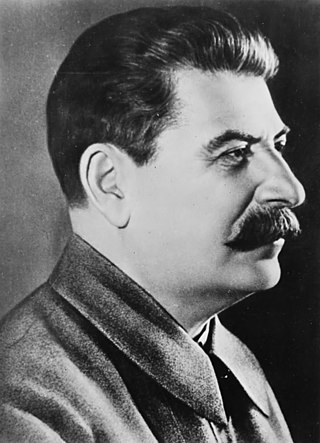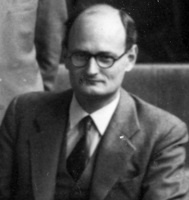Related Research Articles
In historiography, historical revisionism is the reinterpretation of a historical account. It usually involves challenging the orthodox views held by professional scholars about a historical event or timespan or phenomenon, introducing contrary evidence, or reinterpreting the motivations and decisions of the people involved. The revision of the historical record can reflect new discoveries of fact, evidence, and interpretation, which then results in revised history. In dramatic cases, revisionism involves a reversal of older moral judgments.

Totalitarianism is a form of government and a political system that prohibits all opposition parties, outlaws individual and group opposition to the state and its claims, and exercises an extremely high if not complete degree of control and regulation over public and private life. It is regarded as the most extreme and complete form of authoritarianism. In totalitarian states, political power is often held by autocrats, such as dictators and absolute monarchs, who employ all-encompassing campaigns in which propaganda is broadcast by state-controlled mass media in order to control the citizenry.
Geopolitics is the study of the effects of Earth's geography on politics and international relations. While geopolitics usually refers to countries and relations between them, it may also focus on two other kinds of states: de facto independent states with limited international recognition and relations between sub-national geopolitical entities, such as the federated states that make up a federation, confederation, or a quasi-federal system.
International relations theory is the study of international relations (IR) from a theoretical perspective. It seeks to explain behaviors and outcomes in international politics. The four most prominent schools of thought are realism, liberalism, constructivism, and rational choice. Whereas realism and liberalism make broad and specific predictions about international relations, constructivism and rational choice are methodological approaches that focus on certain types of social explanation for phenomena.

The just war theory is a doctrine, also referred to as a tradition, of military ethics that aims to ensure that a war is morally justifiable through a series of criteria, all of which must be met for a war to be considered just. It has been studied by military leaders, theologians, ethicists and policymakers. The criteria are split into two groups: jus ad bellum and jus in bello. The first group of criteria concerns the morality of going to war, and the second group of criteria concerns the moral conduct within war. There have been calls for the inclusion of a third category of just war theory dealing with the morality of post-war settlement and reconstruction. The just war theory postulates the belief that war, while it is terrible but less so with the right conduct, is not always the worst option. Important responsibilities, undesirable outcomes, or preventable atrocities may justify war.

Richard Mervyn Hare, usually cited as R. M. Hare, was a British moral philosopher who held the post of White's Professor of Moral Philosophy at the University of Oxford from 1966 until 1983. He subsequently taught for a number of years at the University of Florida. His meta-ethical theories were influential during the second half of the twentieth century.
Jus ad bellum refers to "the conditions under which States may resort to war or to the use of armed force in general." This is distinct from the set of rules that ought to be followed during a war, known as jus in bello, which govern the behavior of parties in an armed conflict.
Soviet and communist studies, or Soviet studies is the field of historical studies of the Soviet Union and other Communist states as well as historical studies of the Communist parties that existed or still exist in some form in many countries, both inside and outside the former Eastern Bloc, such as the Communist Party USA. Aspects of its historiography have attracted debates between historians on topics including totalitarianism and Cold War espionage.
Jefferson Allen McMahan is an American moral philosopher. He has been White's Professor of Moral Philosophy at the University of Oxford since 2014.
Jus post bellum is a concept that deals with the morality of the termination phase of war, including the responsibility to rebuild. The idea has some historical pedigree as a concept in just war theory. In modern times, it has been developed by a number of just war theorists and international lawyers. However, the concept means different things to the contributors in each field. For lawyers, the concept is much less clearly defined, and many have rejected the usefulness of the concept altogether. The concept continues to attract scholarly interest in the field of international humanitarian law.
Population ethics is the philosophical study of the ethical problems arising when our actions affect who is born and how many people are born in the future. An important area within population ethics is population axiology, which is "the study of the conditions under which one state of affairs is better than another, when the states of affairs in question may differ over the numbers and the identities of the persons who ever live."
Buddhist modernism are new movements based on modern era reinterpretations of Buddhism. David McMahan states that modernism in Buddhism is similar to those found in other religions. The sources of influences have variously been an engagement of Buddhist communities and teachers with the new cultures and methodologies such as "Western monotheism; rationalism and scientific naturalism; and Romantic expressivism". The influence of monotheism has been the internalization of Buddhist gods to make it acceptable in modern Western society, while scientific naturalism and romanticism has influenced the emphasis on current life, empirical defense, reason, psychological and health benefits.

Classical realism is an international relations theory from the realist school of thought. Realism makes the following assumptions: states are the main actors in the international relations system, there is no supranational international authority, states act in their own self-interest, and states want power for self-preservation. Classical realism differs from other forms of realism in that it places specific emphasis on human nature and domestic politics as the key factor in explaining state behavior and the causes of inter-state conflict. Classical realist theory adopts a pessimistic view of human nature and argues that humans are not inherently benevolent but instead they are self-interested and act out of fear or aggression. Furthermore, it emphasizes that this human nature is reflected by states in international politics due to international anarchy.

Targeted Killings: Law and Morality in an Asymmetrical World is a non-fiction compilation book about targeted killing edited by Claire Finkelstein, Jens David Ohlin, and Andrew Altman. It was published by Oxford University Press in 2012. The book grew out of contributions by the authors to a conference in April 2011 at the University of Pennsylvania Law School. Targeted Killings features eighteen essays in five sections arranged by topic. The work argues that after the 11 September attacks by Al-Qaeda in 2001, the United States and other countries began to see the tactic of targeted killing differently. The practice of targeted killing had previously been accepted in situations of self-defence in military settings; after 11 September 2001 it was used to kill non-combatants and those not directly involved in a particular armed force.
The Asymmetry, also known as 'the Procreation Asymmetry', is the idea in population ethics that there is a moral or evaluative asymmetry between bringing into existence individuals with good or bad lives. It was first discussed by Jan Narveson in 1967, and Jeff McMahan coined the term 'the Asymmetry' in 1981. McMahan formulates the Asymmetry as follows: "while the fact that a person's life would be worse than no life at all ... constitutes a strong moral reason for not bringing him into existence, the fact that a person's life would be worth living provides no moral reason for bringing him into existence." Professor Nils Holtug formulates the Asymmetry evaluatively in terms of the value of outcomes instead of in terms of moral reasons. Holtug's formulation says that "while it detracts from the value of an outcome to add individuals whose lives are of overall negative value, it does not increase the value of an outcome to add individuals whose lives are of overall positive value."
In just war theory, a supreme emergency is a situation where a state faces an existential threat from an agressor, which scholars like Michael Walzer and John Rawls argue justifies otherwise unjust action.

Óscar Horta Álvarez is a Spanish animal activist and moral philosopher who is currently a professor in the Department of Philosophy and Anthropology at the University of Santiago de Compostela (USC) and one of the co-founders of the organization Animal Ethics. He is known for his work in animal ethics, especially around the problem of wild animal suffering. He has also worked on the concept of speciesism and on the clarification of the arguments for the moral consideration of nonhuman animals. In 2022, Horta published his first book in English, Making a Stand for Animals.
The politics of resentment, sometimes called grievance politics, is a form of politics which is based on resentment of some other group of people.
"The Meat Eaters" is a 2010 essay by the American philosopher Jeff McMahan, published as an op-ed in The New York Times. In the essay, McMahan asserts that humans have a moral obligation to stop eating meat and, in a conclusion considered to be controversial, that humans also have a duty to prevent predation by individuals who belong to carnivorous species, if we can do so without inflicting greater harm overall.

The moral equality of combatants (MEC) or moral equality of soldiers is the principle that soldiers fighting on both sides of a war are equally honorable, unless they commit war crimes, regardless of whether they fight for a just cause. MEC is a key element underpinning international humanitarian law (IHL)—which applies the rules of war equally to both sides—and traditional just war theory. According to philosopher Henrik Syse, MEC presents a serious quandary because "it makes as little practical sense to ascribe blame to individual soldiers for the cause of the war in which they fight as it makes theoretical sense to hold the fighters on the two sides to be fully morally equal". The moral equality of combatants has been cited in relation to the Israeli–Palestinian conflict or the U.S.-led wars in Iraq and Afghanistan.
References
- ↑ Kirkpatrick, Jesse (2022). "Moral Injury and Revisionist Just War Theory". Ethics & International Affairs. 36 (1): 27–35. doi:10.1017/S0892679422000041.
- ↑ Chehtman, Alejandro (2018). "Revisionist Just War Theory and the Concept of War Crimes". Leiden Journal of International Law. 31 (1): 171–194. doi:10.1017/S0922156517000498.
- ↑ Lazar, Seth (2017). "Just War Theory: Revisionists Versus Traditionalists". Annual Review of Political Science. 20 (1): 37–54. doi: 10.1146/annurev-polisci-060314-112706 .
- ↑ Meireis, Torsten (2017). "Die Revisionist Just War Theory: Jeff McMahan". Handbuch Friedensethik (in German). Springer Fachmedien. pp. 327–339. ISBN 978-3-658-14686-3.